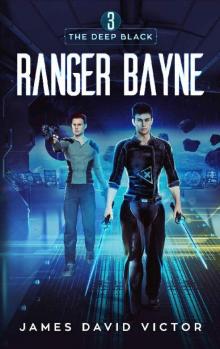 Ranger Bayne
Ranger Bayne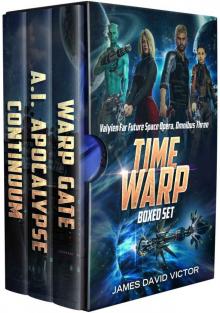 Valyien Boxed Set 3
Valyien Boxed Set 3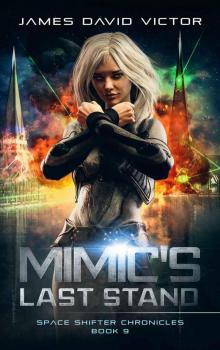 Mimic's Last Stand
Mimic's Last Stand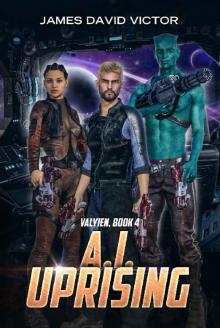 A. I. Uprising (Valyien Book 4)
A. I. Uprising (Valyien Book 4)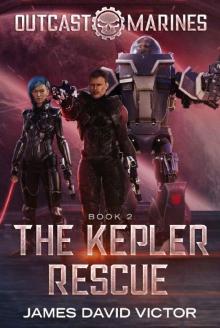 The Kepler Rescue
The Kepler Rescue Last Stand Boxed Set
Last Stand Boxed Set Challenge of Steel
Challenge of Steel Mimic Saves Her People
Mimic Saves Her People Enemy Within (Jack Forge, Lost Marine Book 7)
Enemy Within (Jack Forge, Lost Marine Book 7)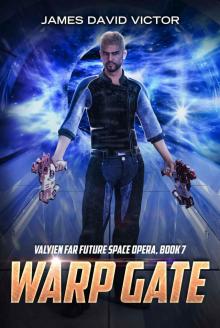 Warp Gate (Valyien Far Future Space Opera Book 7)
Warp Gate (Valyien Far Future Space Opera Book 7) A. I. Apocalypse (Valyien Far Future Space Opera Book 8)
A. I. Apocalypse (Valyien Far Future Space Opera Book 8) Captain Bayne Boxed Set
Captain Bayne Boxed Set Blue Star Marine Boxed Set
Blue Star Marine Boxed Set Night Raiders
Night Raiders Conquest of Earth
Conquest of Earth Betrayal (Jack Forge, Lost Marine Book 6)
Betrayal (Jack Forge, Lost Marine Book 6)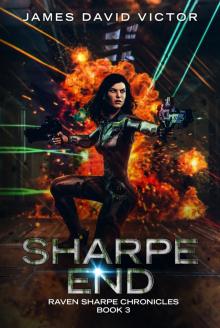 Sharpe End
Sharpe End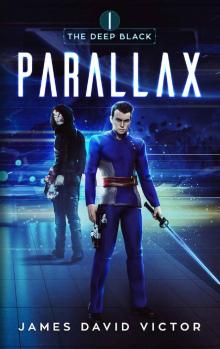 Parallax
Parallax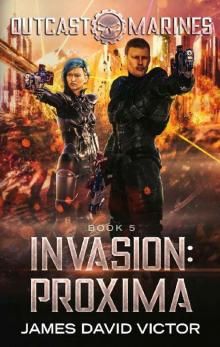 Invasion- Proxima
Invasion- Proxima The Torgoran Revolt (Plundering the Stars Book 3)
The Torgoran Revolt (Plundering the Stars Book 3) Outcast Marines series Boxed Set 2
Outcast Marines series Boxed Set 2 Outcast Marines series Boxed Set
Outcast Marines series Boxed Set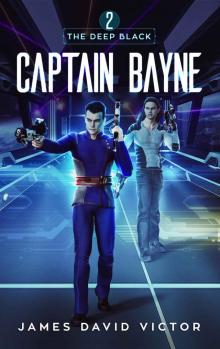 Captain Bayne
Captain Bayne Outcasts of Earth (Outcast Marines Book 1)
Outcasts of Earth (Outcast Marines Book 1) Lost Marine
Lost Marine Eternal Enemy
Eternal Enemy Command Code
Command Code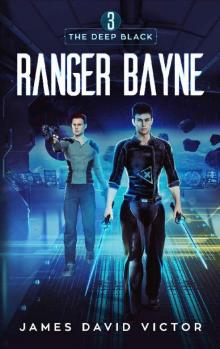 Ranger Bayne (The Deep Black Book 3)
Ranger Bayne (The Deep Black Book 3) Mimic: The Space Shifter Chronicles Boxed Set (Books 1 - 9)
Mimic: The Space Shifter Chronicles Boxed Set (Books 1 - 9) The Deep Black Space Opera Boxed Set
The Deep Black Space Opera Boxed Set Federation at War (Blue Star Marines Book 1)
Federation at War (Blue Star Marines Book 1)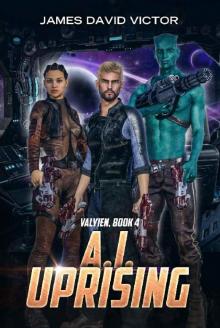 AI Uprising
AI Uprising The Xarren Escape (Plundering the Stars Book 2)
The Xarren Escape (Plundering the Stars Book 2) Valyien Boxed Set 1
Valyien Boxed Set 1 New Enemy (Jack Forge, Lost Marine Book 4)
New Enemy (Jack Forge, Lost Marine Book 4) Alien Legacy
Alien Legacy A I Apocalypse
A I Apocalypse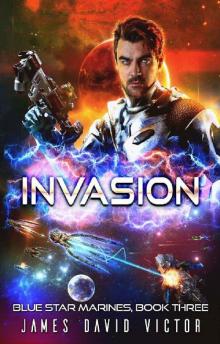 Invasion (Blue Star Marines Book 3)
Invasion (Blue Star Marines Book 3) Alliance (Jack Forge, Lost Marine Book 5)
Alliance (Jack Forge, Lost Marine Book 5)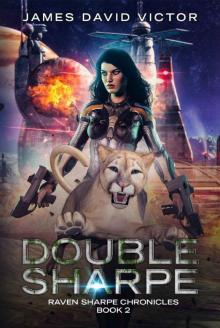 Double Sharpe (Raven Sharpe Chronicles Book 2)
Double Sharpe (Raven Sharpe Chronicles Book 2)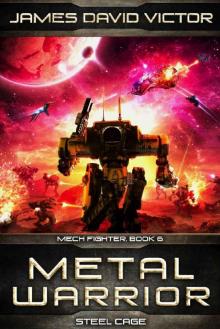 Metal Warrior: Steel Cage (Mech Fighter Book 6)
Metal Warrior: Steel Cage (Mech Fighter Book 6)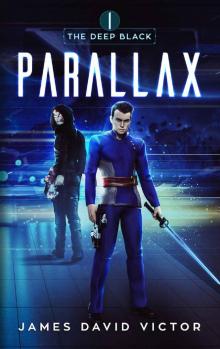 Parallax (The Deep Black Book 1)
Parallax (The Deep Black Book 1)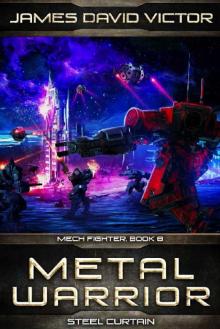 Metal Warrior: Steel Curtain (Mech Fighter Book 8)
Metal Warrior: Steel Curtain (Mech Fighter Book 8)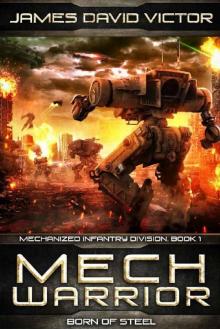 Mech Warrior: Born of Steel (Mechanized Infantry Division Book 1)
Mech Warrior: Born of Steel (Mechanized Infantry Division Book 1) Outcast Marines Boxed Set
Outcast Marines Boxed Set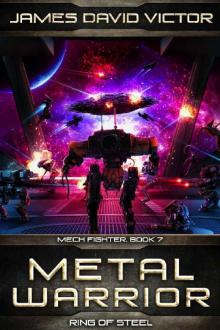 Metal Warrior: Ring of Steel (Mech Fighter Book 7)
Metal Warrior: Ring of Steel (Mech Fighter Book 7) The Elarri Heist (Plundering the Stars Book 1)
The Elarri Heist (Plundering the Stars Book 1) Forged Under Siege (Jack Forge, Fleet Marine Book 6)
Forged Under Siege (Jack Forge, Fleet Marine Book 6) Forging a Trap (Jack Forge, Fleet Marine Book 8)
Forging a Trap (Jack Forge, Fleet Marine Book 8) Daikon (ESS Space Marines Book 2)
Daikon (ESS Space Marines Book 2) Mimic Changes the World
Mimic Changes the World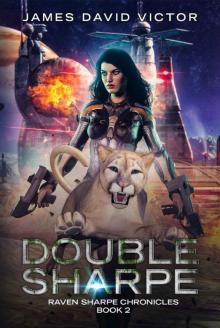 Double Sharpe
Double Sharpe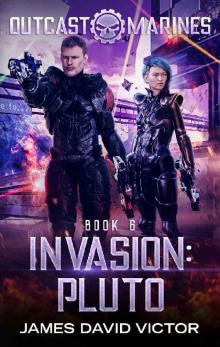 Invasion- Pluto
Invasion- Pluto Mimic and the Fight for Freedom (Space Shifter Chronicles Book 3)
Mimic and the Fight for Freedom (Space Shifter Chronicles Book 3) Forged in Battle (Jack Forge, Fleet Marine Book 5)
Forged in Battle (Jack Forge, Fleet Marine Book 5) Lykos (ESS Space Marines Book 6)
Lykos (ESS Space Marines Book 6)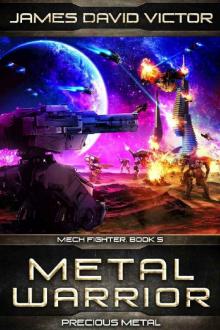 Metal Warrior: Precious Metal (Mech Fighter Book 5)
Metal Warrior: Precious Metal (Mech Fighter Book 5) Forged to Hunt
Forged to Hunt Earth Space Service Space Marines Boxed Set
Earth Space Service Space Marines Boxed Set Alpha Rises
Alpha Rises Power of the Seers (Dragon Oracle Book 4)
Power of the Seers (Dragon Oracle Book 4)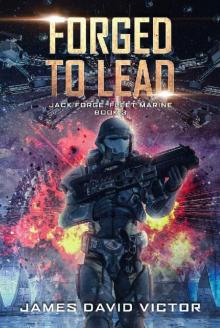 Forged to Lead (Jack Forge, Fleet Marine Book 3)
Forged to Lead (Jack Forge, Fleet Marine Book 3)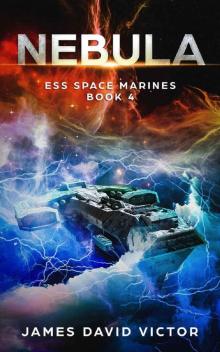 Nebula (ESS Space Marines Book 4)
Nebula (ESS Space Marines Book 4)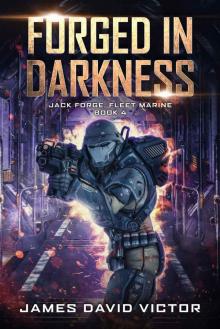 Forged in Darkness
Forged in Darkness Forged in Space
Forged in Space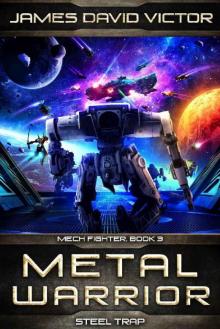 Metal Warrior: Steel Trap (Mech Fighter Book 3)
Metal Warrior: Steel Trap (Mech Fighter Book 3) Mimic and the Space Engineer Boxed Set, Books 1 - 3
Mimic and the Space Engineer Boxed Set, Books 1 - 3 World Breaker Boxed Set (ESS Space Marines Omnibus Book 3)
World Breaker Boxed Set (ESS Space Marines Omnibus Book 3)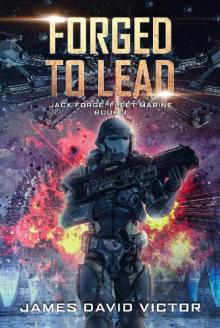 Forged to Lead
Forged to Lead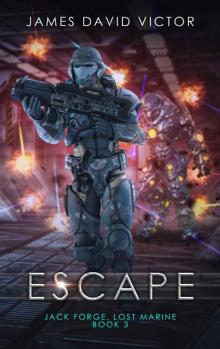 Escape (Jack Forge, Lost Marine Book 3)
Escape (Jack Forge, Lost Marine Book 3) Forged Under Siege
Forged Under Siege Jack Forge, Fleet Marine Boxed Set (Books 1 - 9)
Jack Forge, Fleet Marine Boxed Set (Books 1 - 9)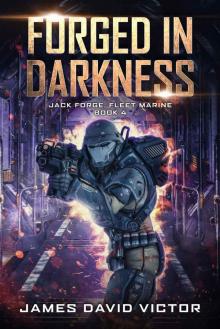 Forged in Darkness (Jack Forge, Fleet Marine Book 4)
Forged in Darkness (Jack Forge, Fleet Marine Book 4) Insurrection
Insurrection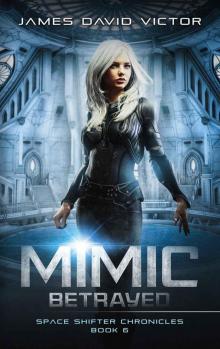 Mimic Betrayed (Space Shifter Chronicles Book 6)
Mimic Betrayed (Space Shifter Chronicles Book 6) Mimic Goes to War (Space Shifter Chronicles Book 5)
Mimic Goes to War (Space Shifter Chronicles Book 5)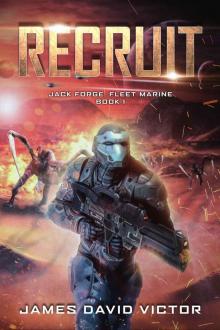 Recruit (Jack Forge, Fleet Marine Book 1)
Recruit (Jack Forge, Fleet Marine Book 1)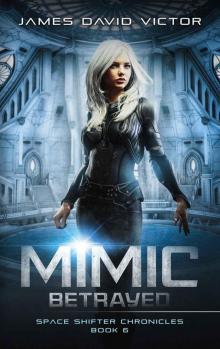 Mimic Betrayed
Mimic Betrayed Power of the Seers
Power of the Seers Mimic and the Journey Home (Space Shifter Chronicles Book 2)
Mimic and the Journey Home (Space Shifter Chronicles Book 2)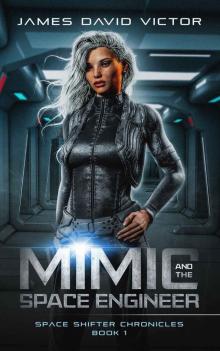 Mimic and the Space Engineer (Space Shifter Chronicles Book 1)
Mimic and the Space Engineer (Space Shifter Chronicles Book 1)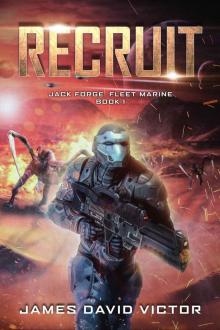 Recruit
Recruit Forged to Hunt (Jack Forge, Fleet Marine Book 7)
Forged to Hunt (Jack Forge, Fleet Marine Book 7) Forged by War (Jack Forge, Fleet Marine Book 9)
Forged by War (Jack Forge, Fleet Marine Book 9) Pursuit (Silver Cane Book 1)
Pursuit (Silver Cane Book 1) Zenith (ESS Space Marines Book 1)
Zenith (ESS Space Marines Book 1) Star Chaser (ESS Space Marines Book 3)
Star Chaser (ESS Space Marines Book 3) Forged in Space (Jack Forge, Fleet Marine Book 2)
Forged in Space (Jack Forge, Fleet Marine Book 2) Defense (Silver Cane Book 2)
Defense (Silver Cane Book 2) Infiltrate (Silver Cane Chronicles Book 3)
Infiltrate (Silver Cane Chronicles Book 3) Alpha Rises (Valyien Book 2)
Alpha Rises (Valyien Book 2) Mimic Raises an Army
Mimic Raises an Army Alien Evolution (Valyien Book 3)
Alien Evolution (Valyien Book 3) Arkana (ESS Space Marines Book 4)
Arkana (ESS Space Marines Book 4) Lykos
Lykos Forging a Trap
Forging a Trap Mimic Goes to War
Mimic Goes to War Earth Space Service Boxed Set: Books 1 - 3 (ESS Space Marines Omnibus)
Earth Space Service Boxed Set: Books 1 - 3 (ESS Space Marines Omnibus) Stranded (ESS Space Marines Book 7)
Stranded (ESS Space Marines Book 7) Mimic Raises an Army (Space Shifter Chronicles Book 4)
Mimic Raises an Army (Space Shifter Chronicles Book 4) Alien Evolution
Alien Evolution Ranger Bayne
Ranger Bayne Valyien Boxed Set 3
Valyien Boxed Set 3 Mimic's Last Stand
Mimic's Last Stand A. I. Uprising (Valyien Book 4)
A. I. Uprising (Valyien Book 4) The Kepler Rescue
The Kepler Rescue Last Stand Boxed Set
Last Stand Boxed Set Challenge of Steel
Challenge of Steel Mimic Saves Her People
Mimic Saves Her People Enemy Within (Jack Forge, Lost Marine Book 7)
Enemy Within (Jack Forge, Lost Marine Book 7) Warp Gate (Valyien Far Future Space Opera Book 7)
Warp Gate (Valyien Far Future Space Opera Book 7) A. I. Apocalypse (Valyien Far Future Space Opera Book 8)
A. I. Apocalypse (Valyien Far Future Space Opera Book 8) Captain Bayne Boxed Set
Captain Bayne Boxed Set Blue Star Marine Boxed Set
Blue Star Marine Boxed Set Night Raiders
Night Raiders Conquest of Earth
Conquest of Earth Betrayal (Jack Forge, Lost Marine Book 6)
Betrayal (Jack Forge, Lost Marine Book 6) Sharpe End
Sharpe End Parallax
Parallax Invasion- Proxima
Invasion- Proxima The Torgoran Revolt (Plundering the Stars Book 3)
The Torgoran Revolt (Plundering the Stars Book 3) Outcast Marines series Boxed Set 2
Outcast Marines series Boxed Set 2 Outcast Marines series Boxed Set
Outcast Marines series Boxed Set Captain Bayne
Captain Bayne Outcasts of Earth (Outcast Marines Book 1)
Outcasts of Earth (Outcast Marines Book 1) Lost Marine
Lost Marine Eternal Enemy
Eternal Enemy Command Code
Command Code Ranger Bayne (The Deep Black Book 3)
Ranger Bayne (The Deep Black Book 3) Mimic: The Space Shifter Chronicles Boxed Set (Books 1 - 9)
Mimic: The Space Shifter Chronicles Boxed Set (Books 1 - 9) The Deep Black Space Opera Boxed Set
The Deep Black Space Opera Boxed Set Federation at War (Blue Star Marines Book 1)
Federation at War (Blue Star Marines Book 1) AI Uprising
AI Uprising The Xarren Escape (Plundering the Stars Book 2)
The Xarren Escape (Plundering the Stars Book 2) Valyien Boxed Set 1
Valyien Boxed Set 1 New Enemy (Jack Forge, Lost Marine Book 4)
New Enemy (Jack Forge, Lost Marine Book 4) Alien Legacy
Alien Legacy A I Apocalypse
A I Apocalypse Invasion (Blue Star Marines Book 3)
Invasion (Blue Star Marines Book 3) Alliance (Jack Forge, Lost Marine Book 5)
Alliance (Jack Forge, Lost Marine Book 5) Double Sharpe (Raven Sharpe Chronicles Book 2)
Double Sharpe (Raven Sharpe Chronicles Book 2) Metal Warrior: Steel Cage (Mech Fighter Book 6)
Metal Warrior: Steel Cage (Mech Fighter Book 6) Parallax (The Deep Black Book 1)
Parallax (The Deep Black Book 1) Metal Warrior: Steel Curtain (Mech Fighter Book 8)
Metal Warrior: Steel Curtain (Mech Fighter Book 8) Mech Warrior: Born of Steel (Mechanized Infantry Division Book 1)
Mech Warrior: Born of Steel (Mechanized Infantry Division Book 1) Outcast Marines Boxed Set
Outcast Marines Boxed Set Metal Warrior: Ring of Steel (Mech Fighter Book 7)
Metal Warrior: Ring of Steel (Mech Fighter Book 7) The Elarri Heist (Plundering the Stars Book 1)
The Elarri Heist (Plundering the Stars Book 1) Forged Under Siege (Jack Forge, Fleet Marine Book 6)
Forged Under Siege (Jack Forge, Fleet Marine Book 6) Forging a Trap (Jack Forge, Fleet Marine Book 8)
Forging a Trap (Jack Forge, Fleet Marine Book 8) Daikon (ESS Space Marines Book 2)
Daikon (ESS Space Marines Book 2) Mimic Changes the World
Mimic Changes the World Double Sharpe
Double Sharpe Invasion- Pluto
Invasion- Pluto Mimic and the Fight for Freedom (Space Shifter Chronicles Book 3)
Mimic and the Fight for Freedom (Space Shifter Chronicles Book 3) Forged in Battle (Jack Forge, Fleet Marine Book 5)
Forged in Battle (Jack Forge, Fleet Marine Book 5) Lykos (ESS Space Marines Book 6)
Lykos (ESS Space Marines Book 6) Metal Warrior: Precious Metal (Mech Fighter Book 5)
Metal Warrior: Precious Metal (Mech Fighter Book 5) Forged to Hunt
Forged to Hunt Earth Space Service Space Marines Boxed Set
Earth Space Service Space Marines Boxed Set Alpha Rises
Alpha Rises Power of the Seers (Dragon Oracle Book 4)
Power of the Seers (Dragon Oracle Book 4) Forged to Lead (Jack Forge, Fleet Marine Book 3)
Forged to Lead (Jack Forge, Fleet Marine Book 3) Nebula (ESS Space Marines Book 4)
Nebula (ESS Space Marines Book 4) Forged in Darkness
Forged in Darkness Forged in Space
Forged in Space Metal Warrior: Steel Trap (Mech Fighter Book 3)
Metal Warrior: Steel Trap (Mech Fighter Book 3) Mimic and the Space Engineer Boxed Set, Books 1 - 3
Mimic and the Space Engineer Boxed Set, Books 1 - 3 World Breaker Boxed Set (ESS Space Marines Omnibus Book 3)
World Breaker Boxed Set (ESS Space Marines Omnibus Book 3) Forged to Lead
Forged to Lead Escape (Jack Forge, Lost Marine Book 3)
Escape (Jack Forge, Lost Marine Book 3) Forged Under Siege
Forged Under Siege Jack Forge, Fleet Marine Boxed Set (Books 1 - 9)
Jack Forge, Fleet Marine Boxed Set (Books 1 - 9) Forged in Darkness (Jack Forge, Fleet Marine Book 4)
Forged in Darkness (Jack Forge, Fleet Marine Book 4) Insurrection
Insurrection Mimic Betrayed (Space Shifter Chronicles Book 6)
Mimic Betrayed (Space Shifter Chronicles Book 6) Mimic Goes to War (Space Shifter Chronicles Book 5)
Mimic Goes to War (Space Shifter Chronicles Book 5) Recruit (Jack Forge, Fleet Marine Book 1)
Recruit (Jack Forge, Fleet Marine Book 1) Mimic Betrayed
Mimic Betrayed Power of the Seers
Power of the Seers Mimic and the Journey Home (Space Shifter Chronicles Book 2)
Mimic and the Journey Home (Space Shifter Chronicles Book 2) Mimic and the Space Engineer (Space Shifter Chronicles Book 1)
Mimic and the Space Engineer (Space Shifter Chronicles Book 1) Recruit
Recruit Forged to Hunt (Jack Forge, Fleet Marine Book 7)
Forged to Hunt (Jack Forge, Fleet Marine Book 7) Forged by War (Jack Forge, Fleet Marine Book 9)
Forged by War (Jack Forge, Fleet Marine Book 9) Pursuit (Silver Cane Book 1)
Pursuit (Silver Cane Book 1) Zenith (ESS Space Marines Book 1)
Zenith (ESS Space Marines Book 1) Star Chaser (ESS Space Marines Book 3)
Star Chaser (ESS Space Marines Book 3) Forged in Space (Jack Forge, Fleet Marine Book 2)
Forged in Space (Jack Forge, Fleet Marine Book 2) Defense (Silver Cane Book 2)
Defense (Silver Cane Book 2) Infiltrate (Silver Cane Chronicles Book 3)
Infiltrate (Silver Cane Chronicles Book 3) Alpha Rises (Valyien Book 2)
Alpha Rises (Valyien Book 2) Mimic Raises an Army
Mimic Raises an Army Alien Evolution (Valyien Book 3)
Alien Evolution (Valyien Book 3) Arkana (ESS Space Marines Book 4)
Arkana (ESS Space Marines Book 4) Lykos
Lykos Forging a Trap
Forging a Trap Mimic Goes to War
Mimic Goes to War Earth Space Service Boxed Set: Books 1 - 3 (ESS Space Marines Omnibus)
Earth Space Service Boxed Set: Books 1 - 3 (ESS Space Marines Omnibus) Stranded (ESS Space Marines Book 7)
Stranded (ESS Space Marines Book 7) Mimic Raises an Army (Space Shifter Chronicles Book 4)
Mimic Raises an Army (Space Shifter Chronicles Book 4) Alien Evolution
Alien Evolution